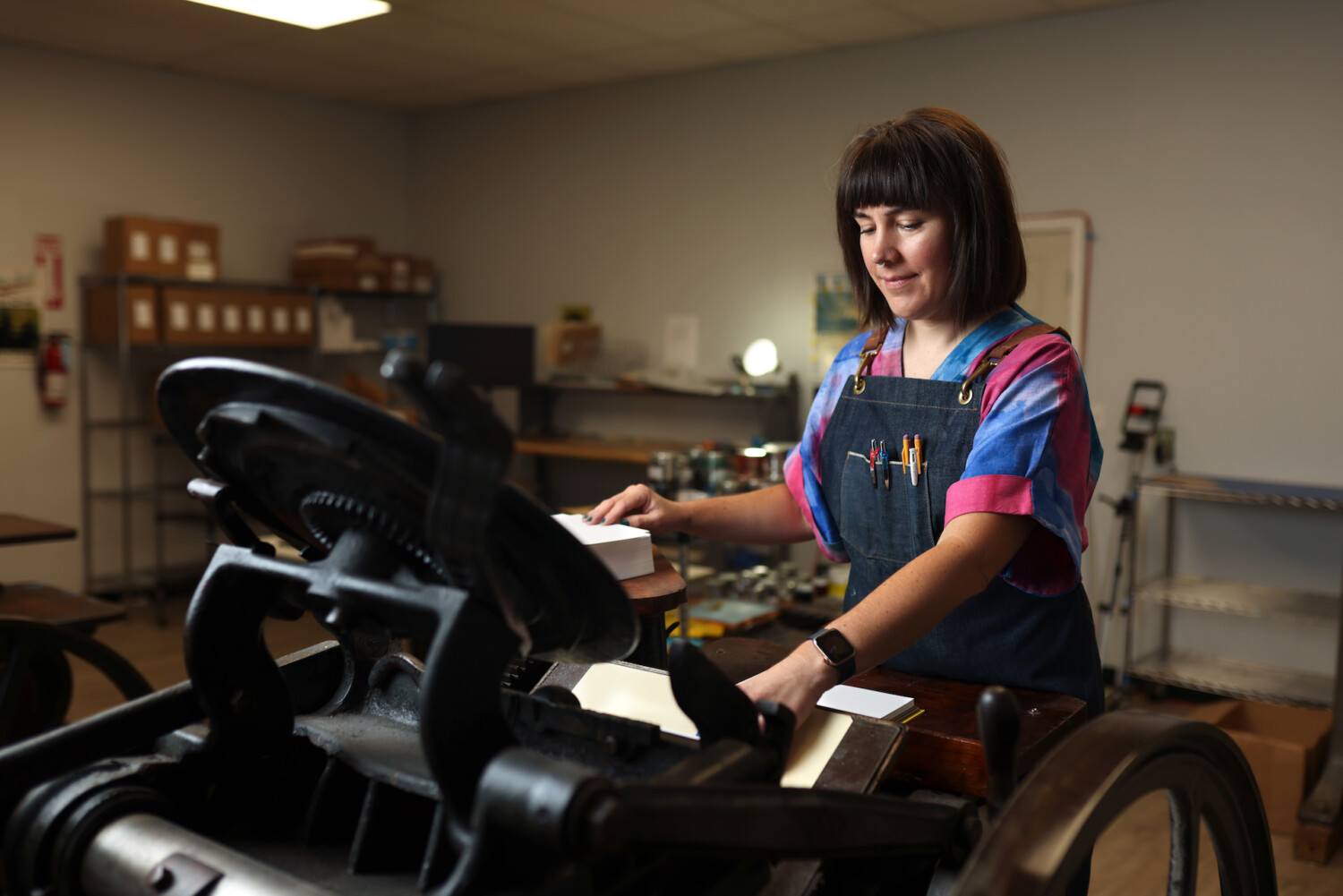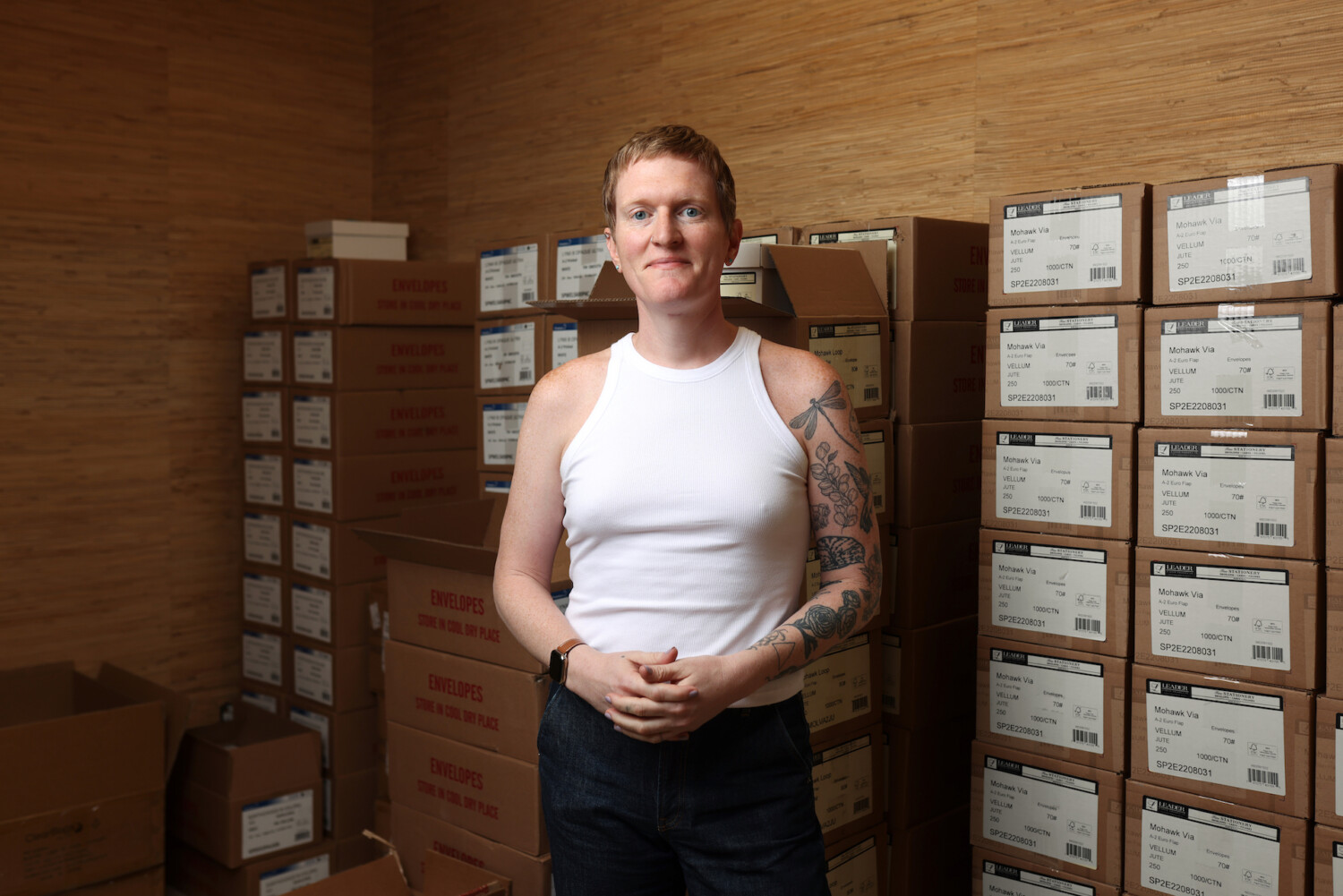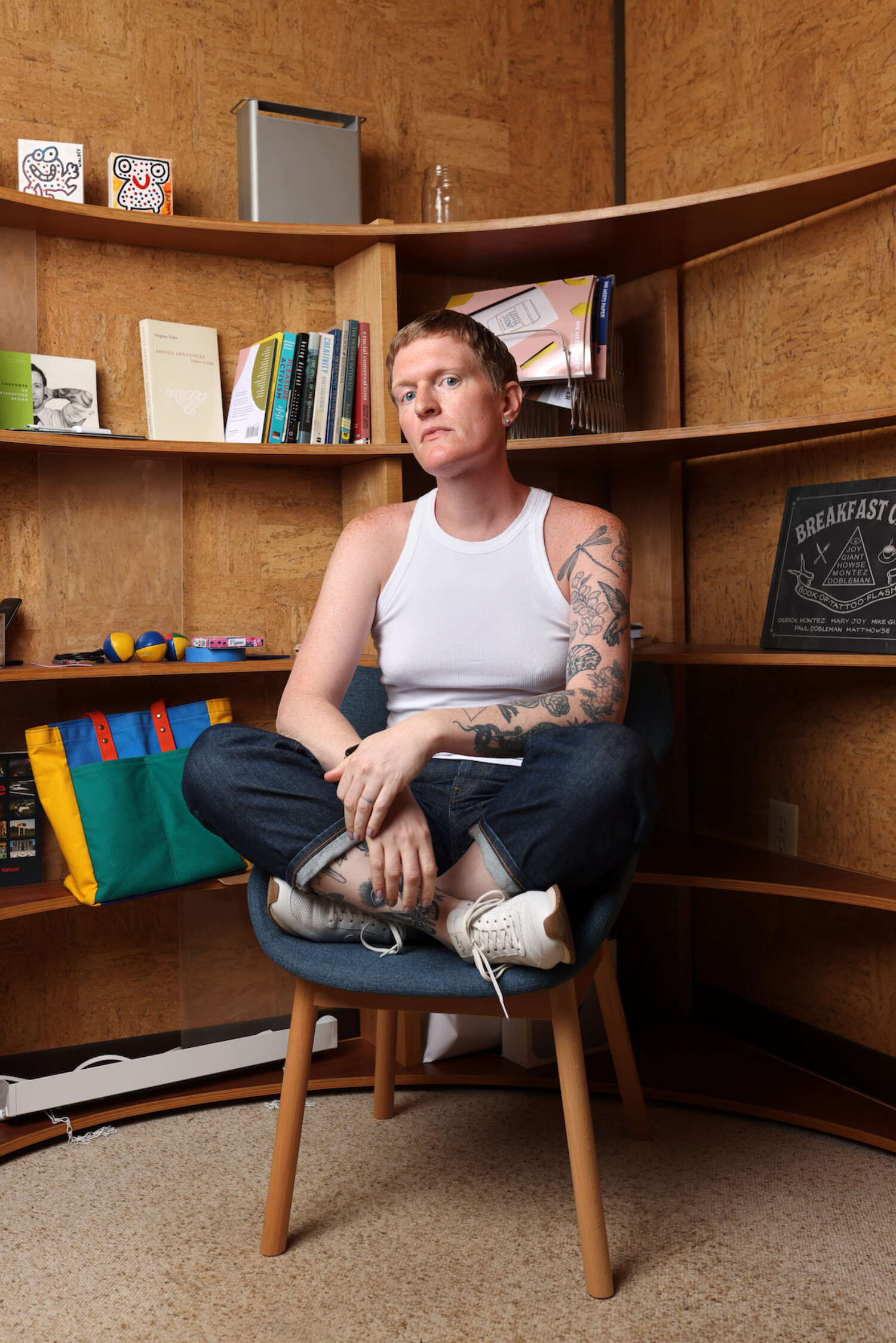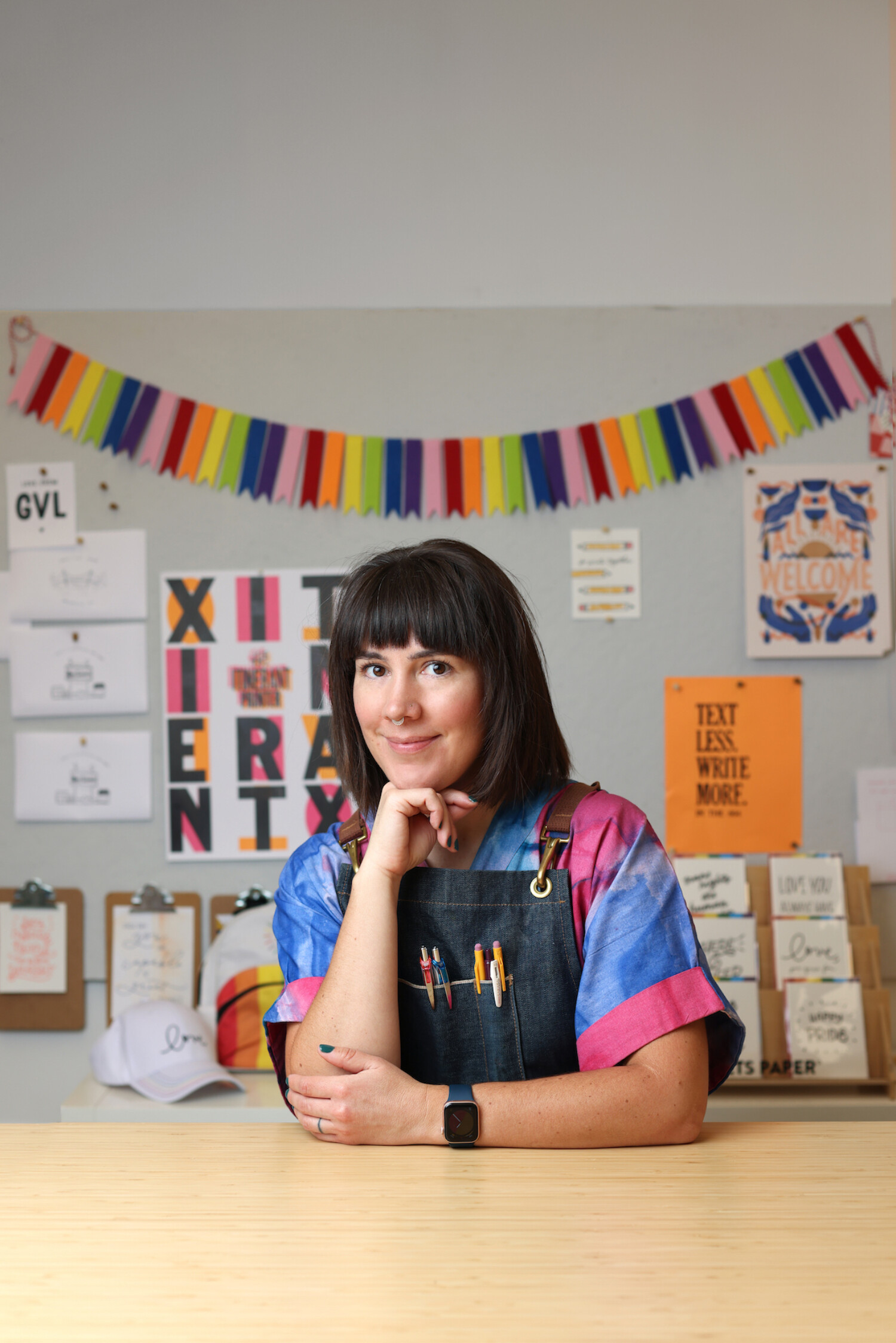Meet Allison and Jamie Nadeau, the wife-and-wife owners of INK MEETS PAPER®. Since 2010, this dynamic duo has been helping people connect through the power of greeting cards. But not just any greeting cards. Using antique printing equipment, INK MEETS PAPER® manufactures hundreds of thousands of lovingly crafted letterpress greeting cards by hand each year. But the cards aren’t actually finished, say Allison and Jamie, until you sit down to write your message inside.
For queer creatives looking to turn their talents into their main livelihood, the INK MEETS PAPER® story is one to inspire and motivate. For Allison and Jamie, time was their greatest teacher in business. By taking things one step at a time, the two grew their creative passion into a thriving business that helps people share love across the country, a resource that lately seems in short supply.
What inspired you to start your company?
Jamie and Allison: While we were living in Savannah, GA, and Jamie was attending Savannah College of Art and Design, we found our love of design and for working on creative projects with one another (which included designing custom stationery and invitations for friends and family). Along with a move to Charleston, SC, and corporate jobs as an editor and interaction designer, we discovered a love for the craft of letterpress printing in 2008 through a printmaking class at a local art studio.
After spending so much time behind the screen, it was refreshing to be so hands-on and involved in the physical process of creating a printed piece. That same year, we purchased our first press, a 1,000+ pound Chandler & Price printing press (made in 1923!) and moved it into a spare bedroom in our house.
At first, we focused solely on learning the craft of traditional printing, rather than immediately trying to turn it into a business (we weren’t exactly sure what we wanted from this). We were both working other full-time jobs at the time, so we were able to take things slowly. As we became comfortable with printing, we started to explore more of the industry (stationery, greeting cards, wedding invitations, and custom printing for others).
Handwritten correspondence really resonated with us — it’s such a beautiful and timeless way to connect with those you love. In particular, we saw greeting cards as an easy and accessible way for people to connect with one another. We started work on developing a collection of greeting cards to help spread a bit more love and kindness and launched the INK MEETS PAPER® greeting card line in 2010.
Since then, we’ve grown our team, printed and shipped hundreds of thousands of cards to retailers across the country (and internationally), added new equipment, opened a retail shop in our Charleston studio, then closed that shop to move our operations to Greenville, SC. All along the way, we’ve continued to add new cards and paper products to the collection, all with the goal of inspiring people to send more handwritten love.
What has been the most rewarding aspect of your founder journey?
J&A: Hearing how people have used our cards to connect with those they love— through so many different life events and occasions. We often say to one another that our products aren’t actually finished until you sit down to write the message (all of our cards are blank inside). Because once you share a part of yourself, the card is truly one-of-a-kind.


Any lessons learned that you would like to share?
J&A: Obstacles and challenges are a constant part of both printing and business ownership! Whether it’s troubleshooting an inking issue with one of our antique presses to navigating supply chain issues while fulfilling wholesale orders with national retailers, it’s just part of the day-to-day. I think once we accepted that challenges and obstacles are a part of life (and business ownership), then it became much easier to move through them rather than allowing them to be this insurmountable hurdle. One step at a time and one day at a time go a long way in moving forward!
Business is all about taking leaps and risks— whether you’re big or small. Jamie likes to say: “Find comfort in the discomfort.” Just when you think you have it figured out, something new comes along (and for business owners, that’s what keeps it exciting).
From learning to operate antique printing equipment to hiring our first employee to producing and shipping pallets of greeting cards to national retailers to moving our entire business and operations from Charleston to Greenville, it’s about continued growth.
Our motto is "where A-ha! meets Oh, sh*tTM". Do you have a personal mantra or motto? What is the meaning behind it?
J&A: Our company motto is “Text less. Write more.®” We believe that with each card sent, the world gets a bit more love and humanity.
A few years ago, Jamie also adopted the motto: “If it’s not a ‘fuck yes,’ then it’s a no,” which helps us to take on initiatives or projects that really get us excited and to let go of the ones we feel more ‘meh’ about.
If you could hit rewind, is there anything you would do differently?
J&A: Not really— I mean, in hindsight, we could have always done something a little differently, but, at the same time, the outcome wouldn’t be what it is today. We’re thankful for the lessons learned along the way and glad that we’ve had each other to lean on as we’ve grown. We’ve been together as a couple for a really long time, and this is our 13th year building INK MEETS PAPER, so we have a deep appreciation for time.
Time isn’t something you can just go out and purchase. Time is the greatest teacher. Each and every moment— the good and the bad— contributes to growth. Learning to ride the ups and downs of economic conditions outside of your control takes years of attempts and failures, but the net result is being a better business owner— worth it.
Did you have any “game-changing” resources or tools that helped you start or grow? Why was that resource a game-changer for you?
J&A: Operationally, we’ve used all sorts of tools and resources throughout the years. Software can both make and break your business. We’ve been through plenty of data migrations across disparate systems but choosing to consolidate our company data under one system continues to be one of the biggest game-changers for us.
We migrated our business to the Zoho One platform (not as well known here in the US) in 2019 and have no intention of changing that anytime soon. Zoho has a steep learning curve, but it's allowed us to accomplish so much more with our data, and I can honestly say that there is no operational goal that we haven't been able to meet with their tools.
Data is hard and the more you can learn to leverage what you have the better. We have found that automation is a direction we continually choose. Small businesses require so many processes, and the more you can automate, the leaner you stay and the more your core team is able to focus on what they are best at (and what they enjoy).
Thinking about the local entrepreneurial community or ecosystem, what do you believe is working well? What do you think is missing or a gap that needs to be filled?
J&A: We’re still new to the Greenville community since we moved just over a year ago now, but we’ve met so many amazing people and other small businesses that we feel very much at home here already. I think the Greenville community as a whole does such a wonderful job supporting creatives, artists, and makers— there is so much talent here! We especially love what the team at the Makers Collective has done in supporting and championing independent small makers and artists— their annual Indie Craft Parade is what first introduced us to Greenville years ago!
We’re also really glad to be a member of the Upstate LGBT Chamber of Commerce. In Charleston, we had Pecha Kucha events and Creative Mornings, which were great for the creative small business community. It would be awesome to see even more opportunities for Greenville creatives to meet regularly.
What do you want your company to look like a year from now – from the marketplace, your products or services, your team, the culture, or revenue – describe how you would like things to look. What have you put in place – or going to put in place – to make that a reality?
J&A: This is a hard question to answer at the moment! For many years we were intensely focused on short-term visioning & planning out the next 2 years. But we have been through so much change in the last year with the move to Greenville. We originally intended to purchase commercial space for our studio and to open brick & mortar retail. Macroeconomic factors far out of our control had us re-examine what the near-term future looks like for the business.
For now, we have an extensive library of original artwork that we’ve started utilizing with licensing opportunities, and we are still very focused on craft-manufacturing our greeting cards. The next 2 years will be filled with more automation, new product launches, and keeping in touch with our existing customers while growing our total customer base.
We talk to founders from marginalized communities, such as female or Black founders, about the barriers that exist when it comes to starting or scaling up a business. From your perspective, what areas do you see founders struggle with the most? Any advice you would give to others that you wish someone would have told you? What would you like to see changed?
J&A: One of my favorite things about small business is that it constantly shows me where I need to grow or where I am stuck. Business ownership will inevitably activate all of your biggest (and often deepest) personal fears. When you take on the challenge of small business ownership as a member of an already marginalized community, the hurdles can feel insurmountable.
One of the ways I got my mind outside of marginalized thinking was to focus on learning the language of business. The language of business is pretty universal (revenues, balance sheets, P&Ls, cash flow) and one of the things we focused on intently during the early years was simply building the best business we possibly could.
One of the most shocking facts I learned was how poorly most businesses are run. If you can be organized, professional, and kind, while providing consistent service or products, you’ll find success. For creative businesses, finding affordable studio space is a tremendous struggle. Especially those who need room to make physical products. One of our long-term dreams would be to find enough financial success that we are able to help provide studio opportunities to small creative businesses that are just getting started.

